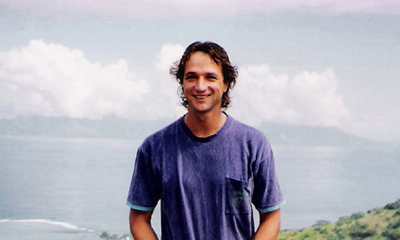Since Jean-Pascal Couraud’s disappearance in mid-December 1997 his friends had been fighting to debunk the notion that he had committed suicide. In 2004 they had thought they could prove that the 37-year-old muckraker had been a victim of foul play. Vetea Guilloux, a member of the local militia Groupe d’intervention de Polynésie (GIP), had alleged that two of his colleagues had killed the investigative journalist. He soon retracted his claim, apparently fearing retaliation.
But on June 25, more than 15 years after the fact, in a move that rocked paradisiacal French Polynesia, a Papeete instruction judge, Jean-François Redonnet, indicted Tino Mara and Tutu Manate, two members of GIP for “the abduction, sequestration, and murder” of the journalist. According to new testimony from Vetea Guilloux, given in December 2012, Jean-Pascal Couraud was seized by GIP members, forced on a small boat, brutally interrogated, and “accidentally” drowned. His body has never been found.
“JPK,” as he was nicknamed after the byline he used for his articles, had made many enemies among the local power elite. For years, as editor-in-chief of Les Nouvelles and later as an assistant to a member of the opposition, he had doggedly investigated the political and financial deals of the local government and published vitriolic attacks against the president of the island, Gaston Flosse, a close friend of former French President Jacques Chirac.
The case languished in the courts amid insinuations that JPK, who had a troubled private life, had committed suicide. Throughout, though, there were strong suspicions that the disappearance was the work of the red-shirted members of the GIP, a thuggish militia created in the 1990s by Flosse and disbanded in 2006. “Tahiti is like a village, which functions in isolation,” Benoit Collombat, a France Inter reporter, said in an interview with the French weekly Telerama. Collombat is author of a 400-page book on the case, Un homme disparaît: l’affaire JPK-15 décembre 1997 (A man disappears: The JPK case – December 15, 1997). “Everyone knows everyone. If you break the omerta the consequences are immediate. Certain witnesses have been pressured. Some journalists have even been physically aggressed.”
Both former “red shirts” are presumed innocent but the two have been placed under judicial control and prohibited from leaving the territory. Their lawyer, François Quinquis, has brushed away the accusations and even welcomed the indictment, arguing that it would finally allow him access to the judicial file.
The indictments have been a bombshell in the capital, Papeete, where the 81-year-old Gaston Flosse is beginning a new term as president after his election in May. The right-wing politician has always denied any role in the disappearance of Jean-Pascal Couraud, and key witness Vetea Guilloux apparently did not implicate him but, as Le Monde wrote last March, “the judiciary has established that Mr. Flosse had ordered his henchmen to put the ex-journalist under surveillance.”
“Whatever happens,” Collombat told the Paris weekly Telerama, “Gaston Flosse has at least a moral responsibility in the case since he was the one who created the GIP and put it to his service.”
There might still be surprises and rebounds in this murky murder case that has exposed Tahiti’s rough political scene, but as Collombat told Telerama,”a milestone has been reached.” The impunity that prevailed for so many years may be fading away.
